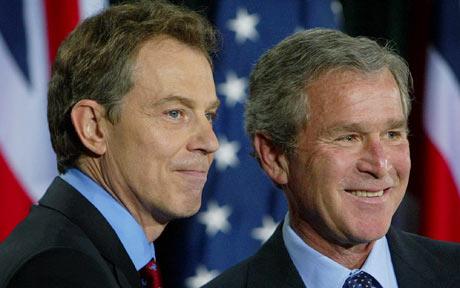
Possibly the most striking and chilling phrase to come out of the Chilcot report on the circumstances of the decision to invade Saddam Hussein’s Iraq is Tony Blair’s assurance to George Bush in July 2002: “I will be with you, whatever.” As the Independent comments, these are like the words of a lover promising to be faithful till death us do part. They suggest a level of emotion and relationship not often admitted between national leaders. They also indicate how the emotional needs and responses of one person might precipitate the death of thousands.
One of the best-known concepts that came out of the work of Adorno, Horkheimer and other members of the Frankfurt Group in the 1930s and 1940s, when they were trying to explain the catastrophe of Nazism, was the “authoritarian personality”. Although their work, including this concept, has been much critiqued subsequently, the Frankfurt school’s overall project of linking psychological characteristics with social movements offered original, holistic and connected thinking about the interplay of personality and power.
Adorno and Horkheimer explained the attraction of Fascism in terms of its providing psychic satisfactions for both leaders and followers. Put simply, leaders gained a sense of power by commanding a mass following, while followers gained a sense of security from their obedience. But the key concept was that these characteristics – of dominance and subservience – existed in everybody and were mobilised by particular social conditions. Hitler came to power as a result of the hopelessness engendered by the economic collapse of the early 1930s. The Nazi movement allowed the “masses” (as Hitler repeatedly called them in his autobiography Mein Kampf) to gain confidence from the direction of a “strong” leader, and also provided many opportunities for officers to exercise their own cruelty and dominance, most obviously over the despised “other”, Jewish people.
When Tony Blair pledged himself to George Bush, he was gaining both security and power. He was stepping onto the world stage of military intervention as the companion of a man whose country had (as Blair has said in his recent statement) 95% of the assets required to go to war in Iraq. He followed Bush, but, as the Chilcot report reveals, he was not merely pulled along by events. In the UK, he pursued his desire for power single-mindedly, manipulating both his Cabinet and Parliament and, through his performance as a charismatic speaker and with the support of much of the media, the people also. It was only when the deception involved in going to war and the disastrous consequences of the enterprise became clear that the charisma of Blair faded.
Today, the day after the publication of the Chilcot report, the current leader of the Labour Party is criticised in the media for not using the Chilcot revelations to launch a swingeing attack on Blair. He is also, of course, more widely criticised for his supposed incapacity to unite the Labour Party and secure sufficient votes to defeat the current government in the next election. Jeremy Corbyn is a very different person from Tony Blair. In March 2003, he demonstrated outside Parliament with 2 million others to protest the imminent invasion of Iraq. He addressed the crowd competently, but, then as now, the inspiration that he gives his many followers derives from what he says rather than from the way he says it. He is constantly criticised in the press and by members of the Parliamentary Labour Party for lacking the capacity for leadership – although the Labour Party now has more members, many of whom have joined because of Corbyn’s unwavering socialist principles, than ever before. In part, at least, this supposed incapacity for leadership derives from his refusal to personalise politics in the way that is common in most political discourse.
Perhaps Corbyn will not succeed in attracting sufficient voters in a general election to unseat the current government, split and chaotic though it is. But he is modelling a new kind of politics and a new kind of leadership where authenticity and principle replace charisma and deceit. It would be good to think that people might follow him because of his policies and values rather than for the irrational motives of the authoritarian personality.
Dear John, Well said! Now are we going to see a split in the Labour Party? Are we going to have an early General Election? When will we see Proportional Representation arrive? Pax et Bonum Rita
LikeLiked by 1 person
[…] easily to the lips of those with an anti-democratic agenda. As Adorno and colleagues in the Frankfurt School argued after the rise of Nazism, the simple remedies of Fascism have a particular appeal to those […]
LikeLike